
|
||||||||||||||||||||
|
And You Call Yourself A Scientist!
|
|
|
B-Notes
|
|
|
Badmovies.org
|
|
|
Cold Fusion
|
|
|
Jabootu
|
|
|
Opposable Thumb Films
|
|
|
Stomp Tokyo
|
|
|
Teleport City
|
|
So once again, I discovered I had been lied to by Famous Monsters magazine.
Oh, I bear no enmity, I possess no rancor. Sure, they had snowed me completely on the matter of Dracula vs. Frankenstein. So it wasn't the greatest horror movie ever made. So Zandor Vorkov was a name Forry Ackerman dreamed up to make stockbroker Roger Engel seem more sinister. So they devoted practically an entire issue to it. In the day, FM was about the only commercial outlet, the only source of information for things macabre; it formed a large part of my early education, and I have a great fondness for those memories. So I forgive it - again.
You see, what we have here is the latest B-Masters Roundtable. The topic of choice is body parts acting independently of the corpus major, and casting your eyes over the list of films above will show you that it is a topic with far more diverse and wide-ranging interpretations than we've had in a while. When a topic is voted into shiny officialdom, I immediately dive into my Boxes of Movies to Watch & Review (I started out with one box - they now total five) and select my victim. Behold, an acquisition from a BlockWood Previously-Viewed sale, The Beast With Five Fingers "in glorious black and white!"
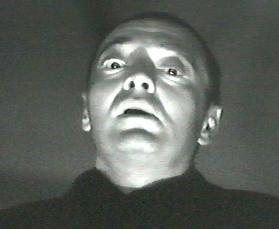 I
have seen a lot of movies, but I have by no means seen every
movie I intend to (in fact, in a perfect world, the day that
I can no longer think of a movie I wish to see but have not
will be my last day on Earth), so finding Beast - which,
if memory served, was one of those 40s "classic"
horrors Forry kept baying about - at a low price was fortuitous.
Now I could get to plugging that particular hole in my education
and fulfill my B-Master obligations at the same time.
I
have seen a lot of movies, but I have by no means seen every
movie I intend to (in fact, in a perfect world, the day that
I can no longer think of a movie I wish to see but have not
will be my last day on Earth), so finding Beast - which,
if memory served, was one of those 40s "classic"
horrors Forry kept baying about - at a low price was fortuitous.
Now I could get to plugging that particular hole in my education
and fulfill my B-Master obligations at the same time.
You'd think I'd learn by now, don't you? After a month spent banging my head against an unyielding wall, trying to think of something new and worthwhile to say about the 1931 Frankenstein (an experience which left me a broken man), I should have more sense than to take on a movie nearly 50 years old, in the "classic" realm. Well, we're all here, so we might as well get on with it... we'll see about this "classic" thing, and a few other things as well.
In a quaint beginning-of-the-century Italian village, famed concert pianist Francis Ingram (Victor Francen) has retired to his mansion, his right side paralyzed from a massive stroke. His constant companion is a nurse he brought back with him from the States, the lovely Julie (Andrea King); also providing him with diversion is Lovable Rogue™ Conrad (Robert Alda), yet another expatriate who makes a living selling fake antiques to tourists with money to burn, and playing chess with Ingram at 10 lire a game. Rounding out the household is Ingram's secretary, Hillary (Peter Lorre), who spends much of his time in the library poring over his Astrology books, seeking to find the Ultimate Knowledge "lost when the library at Alexandria was burned".
The life at Villa Ingram is far from ideal; the pianist has
fallen in love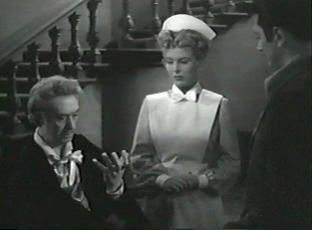 with his young nurse and this affection has soured under the
pressure of his invalid condition to a sort of needy obsession.
Julie cannot leave his side for a few minutes without her
charge angrily shouting for her, so she decides to leave Ingram's
service, a decision of which Conrad approves - he has also
become smitten with her - and which is greeted by dismay from
Hillary, who knows that as long as Julie is around to distract
Ingram, he will be allowed to continue his studies in peace.
with his young nurse and this affection has soured under the
pressure of his invalid condition to a sort of needy obsession.
Julie cannot leave his side for a few minutes without her
charge angrily shouting for her, so she decides to leave Ingram's
service, a decision of which Conrad approves - he has also
become smitten with her - and which is greeted by dismay from
Hillary, who knows that as long as Julie is around to distract
Ingram, he will be allowed to continue his studies in peace.
At a dinner attended by Julie, Conrad, Hillary and the pianist's lawyer Duprex (David Hoffman), Ingram quizzes each as to their opinion of his sanity and then demands they sign as witnesses a paper which the lawyer produces. Though each does so with only a little curiosity as to what they are signing, the audience is pretty confident they know what is going on - a state of affairs that will continue to plague the viewer as the picture progresses.
In the garden after the signing, Julie and Conrad make plans to run away together. It is Hillary that responds to Ingram's cries of "Julie!", having spied on the two lovers in the garden. He gleefully - and not a little meanly - tells the pianist of their tryst. Ingram insists that he is lying, and in anger, tries to strangle the man with his left hand, which has become unnaturally strong during his recuperation. He is stopped only by Julie's timely arrival.
That night, Ingram wakes from a restless sleep to find that Julie is not sitting by his bedside, as he demands. He hauls himself into a wheelchair and pushes himself through the house with a cane, yelling for her. And doesn't watch where he's going, because he propels himself right down the stairs, to his death.
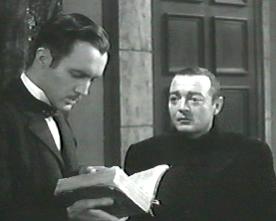 Ingram's
only blood relations - and that, by marriage - the Arlingtons,
Raymond and his son, Donald (Charles Dingle and John Alvin)
arrive at the villa and immediately begin gleefully predicting
how much they'll make by selling off Ingram's possessions.
This especially rouses the ire of Hillary as they start pricing
his astrology books; all this is made moot when the new will
that everyone signed (remember?) is read, leaving the entire
estate to Julie. Raymond immediately makes noises about contesting
the will, and Duprex secretly agrees to aid the relatives
in breaking the will in exchange for a third of the estate
- an offer which, he assures the greedy Raymond, he would
also make to Julie. Sensing a kindred soul, Raymond agrees,
and Duprex retires to his room to start the paperwork.
Ingram's
only blood relations - and that, by marriage - the Arlingtons,
Raymond and his son, Donald (Charles Dingle and John Alvin)
arrive at the villa and immediately begin gleefully predicting
how much they'll make by selling off Ingram's possessions.
This especially rouses the ire of Hillary as they start pricing
his astrology books; all this is made moot when the new will
that everyone signed (remember?) is read, leaving the entire
estate to Julie. Raymond immediately makes noises about contesting
the will, and Duprex secretly agrees to aid the relatives
in breaking the will in exchange for a third of the estate
- an offer which, he assures the greedy Raymond, he would
also make to Julie. Sensing a kindred soul, Raymond agrees,
and Duprex retires to his room to start the paperwork.
Meantime, a panicking chambermaid and the Arlingtons (in the garden enjoying a post-conspiracy smoke) notice the same thing: there is a light in Ingram's mausoleum, which almost instantly blinks out. A quick visit reveals no one in the tomb. However...Duprex is interrupted in his scribbling by the turning of the knob on his chamber door... the door creaks open, and a hand, its index finger adorned by the garishly large ring Ingram always wore, scrabbles about the latch... and the lawyer reacts in horror as something rushes upon him....
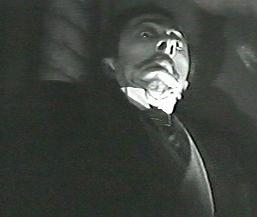 Later
that night, Raymond and Julie are roused by the piano playing
in the main room. Not only was the piano locked after Ingram's
death, but the piece being played is one the dead pianist
performed every day - a transposition of a Bach composition
written by Conrad especially for Ingram's one good hand. Mystified,
Raymond and Julie descend the stairs to find not only the
piano unlocked, but Ingram's ring - supposedly interred with
him - placed on the piano, where it always rested when he
played. As Donald comes down to see what the ruckus is about,
he discovers what the other two missed: the dead body of Duprex,
a look of horror on his face and bruises on his neck that
look suspiciously like the ones Hillary bears from Ingram's
attack...
Later
that night, Raymond and Julie are roused by the piano playing
in the main room. Not only was the piano locked after Ingram's
death, but the piece being played is one the dead pianist
performed every day - a transposition of a Bach composition
written by Conrad especially for Ingram's one good hand. Mystified,
Raymond and Julie descend the stairs to find not only the
piano unlocked, but Ingram's ring - supposedly interred with
him - placed on the piano, where it always rested when he
played. As Donald comes down to see what the ruckus is about,
he discovers what the other two missed: the dead body of Duprex,
a look of horror on his face and bruises on his neck that
look suspiciously like the ones Hillary bears from Ingram's
attack...
The local police Commissario (J. Carrol Naish) arrives with his men to investigate, and he, Conrad and Raymond visit the mausoleum to reveal what Raymond is certain is Julie and Conrad's duplicity. What they find, however, is a disturbed coffin... Ingram's corpse with a dagger in its right hand and its left hand sawed-off and missing - and a window with one pane broken out, from the inside. On the exterior, they find a single handprint on the ground outside the window, and a series of curious tracks leading away from the crypt toward the house, as if the missing hand scuttled away like a spider.
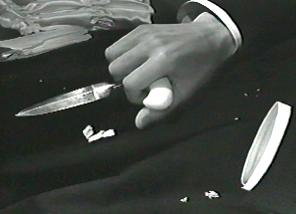 Not
surprisingly, the villagers begin to shun Julie and Conrad
whenever they come to town, feeling that the villa is under
a curse. This convinces the two that it is definitely time
to vacate the premises, but the Commissario is having
none of that, and refuses to grant them exit visas until the
mystery of the lawyer's death is solved (even though being
a superstitious villager himself, he's leaning toward the
Vengeful Hand Theory). To this end, he's making everyone
stay at the villa, including himself.
Not
surprisingly, the villagers begin to shun Julie and Conrad
whenever they come to town, feeling that the villa is under
a curse. This convinces the two that it is definitely time
to vacate the premises, but the Commissario is having
none of that, and refuses to grant them exit visas until the
mystery of the lawyer's death is solved (even though being
a superstitious villager himself, he's leaning toward the
Vengeful Hand Theory). To this end, he's making everyone
stay at the villa, including himself.
Meantime, young Donald surprises Hillary by revealing that he knows of the existence of a hidden safe in the library, and that Ingram even taught him the combination when he was a child. After the high-strung Hillary orders him to get out, Donald returns in the middle of the night to fiddle with the safe, hoping to find an older version of the will that named him the sole heir. He is interrupted in this by ghostly piano playing.
Ghostly may be correct, as the wily Commissario was following Donald, and was forced into hiding by the music; from his hiding place he can see that there is no one at the piano. The music stops as Donald opens the library door and peers into the room... and the Commissario sees a scrabbling hand, its finger adorned by that huge ring, at Donald' throat...
The hand is stopped in its work by Donald's' scream and the Commissario's outcry. Alive, but feverish and unconscious, Donald is remanded to his room. From the window, Hillary sees the last of the housestaff fleeing into the night, away from the fearful shadow of the Hand...
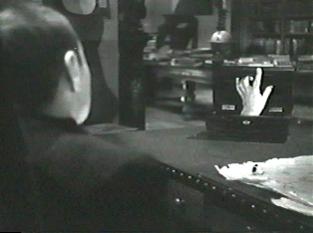 Later
that night, Hillary sits at his desk in the library. He absently
opens a drawer and withdraws Ingram's huge ring. Aha,
we think, it's been pretty obvious all along. And indeed
it has - at least until the cigar humidor on the desk opens
up and the disembodied hand scrabbles out, crawling across
the table to present its index finger to Hillary, demanding
its ring. Hillary dutifully places the ring on the outstretched
finger. Then he grabs the hand and shuts it in the drawer.
Later
that night, Hillary sits at his desk in the library. He absently
opens a drawer and withdraws Ingram's huge ring. Aha,
we think, it's been pretty obvious all along. And indeed
it has - at least until the cigar humidor on the desk opens
up and the disembodied hand scrabbles out, crawling across
the table to present its index finger to Hillary, demanding
its ring. Hillary dutifully places the ring on the outstretched
finger. Then he grabs the hand and shuts it in the drawer.
The distraught Hillary finds Conrad and reveals he has caught the hand. When Conrad searches the desk and finds nothing, he begins to seriously doubt Hillary's sanity (What? Just now? he's Peter Lorre, for gosh sake!). Once Hillary is alone again, however, books begin to fall from a nearby shelf. The hand is behind the tomes, scampering about like a massive spider. Hillary once again grabs the hand, and opens another drawer, which contains a hammer and some nails...
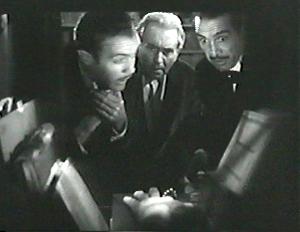 The
exhausted Hillary retires to his room, informing the bemused
Conrad in passing that he's trapped the hand, and it will
do nobody any more harm.
The
exhausted Hillary retires to his room, informing the bemused
Conrad in passing that he's trapped the hand, and it will
do nobody any more harm.
Charles awakens from his fever, remembering the jingle Ingram taught him that contained the combination of the safe (fittingly, it is about the number and names of bones in the hand). Accompanied by his father and the Commissario, Donald unlocks the safe... only to find this is where Hillary had "trapped" the hand, nailed to a book. Fearfully clutching his injured throat and crying like a little girl, Donald runs out into the night, pursued by the men (including Conrad, who was out in the garden, enjoying, yes, a smoke).
Which of course leaves Julie alone in the house with Hillary.
Hillary is on the balcony overlooking the piano, listening
to what he thinks is the hand playing; from Julie's point
of view, however, there is no hand and the room is silent.
She proceeds to make the Typical Heroine Mistake™ of
telling Hillary that there is no hand, he is nuts and she
knows that he is the one who actually killed the lawyer. Going
on to compound the error, she tells him he has to confess
to the police, 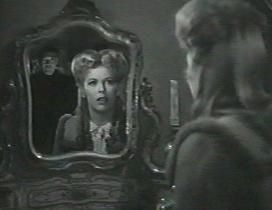 and
she's sure they'll let him take his books to the madhouse.
And if you guessed that her next pronouncement is that if
Hillary doesn't tell them, she will, golly, you know your
Typical Heroine Mistakes™. Not to mention if you figured
out that Hillary feels that killing Julie is a much more expedient
solution to his troubles.
and
she's sure they'll let him take his books to the madhouse.
And if you guessed that her next pronouncement is that if
Hillary doesn't tell them, she will, golly, you know your
Typical Heroine Mistakes™. Not to mention if you figured
out that Hillary feels that killing Julie is a much more expedient
solution to his troubles.
If there is one thing that saves us from deeming Julie totally an idiot at this point, it is that she has the wit to tell Hillary that she now hears the hand playing the piano, so she must have been wrong, and begging the knife-weilding madman to save her from the hideous hand. His sleepy eyes gleaming, Hillary heads off to the lower floor, leaving Julie time to lock herself in her room until the men come back (good grief, how far did Donald run?)
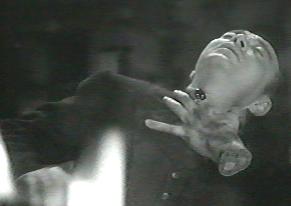 Hillary
has his final run-in with the hand, tossing it into a fireplace
and stoking the flames high. However, the murderous mitt crawls
out of the fire and latches itself about his throat, finally
vanishing as Hillary dies. The end. Well, no it's not, but
we'll handle what follows in my bitch session, following.
Hillary
has his final run-in with the hand, tossing it into a fireplace
and stoking the flames high. However, the murderous mitt crawls
out of the fire and latches itself about his throat, finally
vanishing as Hillary dies. The end. Well, no it's not, but
we'll handle what follows in my bitch session, following.
Beast remains a creature of its time - witness the fact that the entire first half-hour is dedicated to establishing character, locale, and plot, a situation which might not sit well with viewers weaned on movies like the recent remake of House On Haunted Hill, which shamelessly jettisoned character-developing scenes in order to get to "the good stuff" more quickly. The result was a cast of characters about which we did not care, drastically stunting any sense of dread the film attempted to conjure. I wish I could say that the result of the more leisurely approach taken by Beast results in the opposite extreme, but such is not the case. It's still hard to care about these folk.
For instance, our supposed hero, Conrad the Lovable Rogue™. It's usually mandatory that a Lovable Rogue™ do something halfway heroic at some point to justify the "Lovable" part of the archetype, but Conrad never truly fulfills that end of the formula. Oh, he is quick-witted and charming enough - I wouldn't mind quaffing a brew or two with him, but my non-beer-holding hand would remain firmly on my wallet. In the absence of any other notable activity other than his various cons, it enters the viewer's mind rather too easily that his pat admission of love for Julie is yet another scam, a means for him to escape the current dead end of his life.
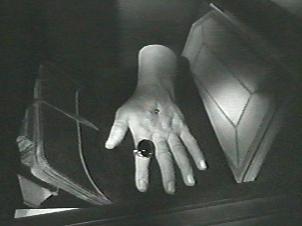 It
is automatically assumed that we will feel some sympathy for
Julie, trapped as she is in an odious situation - there are
other types of abusive relationships than those that involve
physical blows - but her character can be maddeningly inconsistent.
She shows some spine in the reading-of-the-will scene, when
Conrad responds to Raymond's protests by revealing that Julie
was, in fact, packing to leave and probably has no intention
of taking possession of the estate; she immediately - with
a good deal of steel in her voice - announces that she has
every intention of remaining. Whether she does this from hatred
of the avaricious Arlingtons, sympathy for Hillary who is
in fear of losing his beloved books, simple outrage at Conrad's
assumption or even that she likes the idea of being
rich is never elaborated, and all are valid interpretations.
Though she never becomes a weepy, useless piece of set decoration,
she is rarely again afforded that sort of strength - and there
is one moment in which she would have been justified in coldcocking
Raymond. Or Conrad could have, had he been more of an actual
hero.
It
is automatically assumed that we will feel some sympathy for
Julie, trapped as she is in an odious situation - there are
other types of abusive relationships than those that involve
physical blows - but her character can be maddeningly inconsistent.
She shows some spine in the reading-of-the-will scene, when
Conrad responds to Raymond's protests by revealing that Julie
was, in fact, packing to leave and probably has no intention
of taking possession of the estate; she immediately - with
a good deal of steel in her voice - announces that she has
every intention of remaining. Whether she does this from hatred
of the avaricious Arlingtons, sympathy for Hillary who is
in fear of losing his beloved books, simple outrage at Conrad's
assumption or even that she likes the idea of being
rich is never elaborated, and all are valid interpretations.
Though she never becomes a weepy, useless piece of set decoration,
she is rarely again afforded that sort of strength - and there
is one moment in which she would have been justified in coldcocking
Raymond. Or Conrad could have, had he been more of an actual
hero.
It is tempting, then, to claim that the picture belongs to Peter Lorre, but even then, that is not the case, not until the final act, when that hand crawls out of the cigar box. Few actors could handle the ebb-and-flow freakout scenes like Lorre, and at that point Beast becomes definably another movie.
Rumor has it that director Robert Florey and Lorre wanted to ditch Curt Siodmak's script and do a more fantastic interpretation of the scenario, but it was not to be; certainly, Beast is more in line with Siodmak's original script for the earlier Universal chiller The Wolfman, in which there existed the possibility that Lawrence Talbot's transformations into the titular creature occurred solely in the man's tortured mind. There is the briefest of moments that the audience may believe that Ingram's severed hand is actually capering about committing carnage, but that notion is quickly put paid by alternating the viewpoint between the hallucinating Hillary and the more lucid Julie.
 Spanish
surrealist filmmaker Luis Buñuel was supposedly imported
for the hand scenes, and the brilliance of those scenes argues
for it. Technically, these scenes are almost all flawless
- the single instance when the hand is obviously a thing of
rubber and mechanics only serves to underline the quality
of the other shots. It is a sad comment upon my usual diet
of movies that I spent much of my time peering at the hand,
expecting a hazy Bert I. Gordon matte line and finding none.
The scene of the disembodied hand - eerily, beautifully, and
impossibly - playing the piano gives us a glimpse into the
picture that might have been, and at least Famous Monsters
didn't lie to me about that.
Spanish
surrealist filmmaker Luis Buñuel was supposedly imported
for the hand scenes, and the brilliance of those scenes argues
for it. Technically, these scenes are almost all flawless
- the single instance when the hand is obviously a thing of
rubber and mechanics only serves to underline the quality
of the other shots. It is a sad comment upon my usual diet
of movies that I spent much of my time peering at the hand,
expecting a hazy Bert I. Gordon matte line and finding none.
The scene of the disembodied hand - eerily, beautifully, and
impossibly - playing the piano gives us a glimpse into the
picture that might have been, and at least Famous Monsters
didn't lie to me about that.
Instead, we are given a picture that ends with Julie packing and announcing that she is signing over the entire estate to the Arlingtons - that's right, the greedhead bad guys win - and the Commissario explaining, in Scooby-Doo style, that Hillary created the illusion of the piano playing via a hidden pull-chain in the library, which operated a gramophone concealed in a suit of armor. Exactly when did Hillary install that? Especially such a well-done, workmanlike job? It only gets worse when the returned housemaid spots a glove the Commissario dropped on the stair, and swoons, thinking it The Hand.
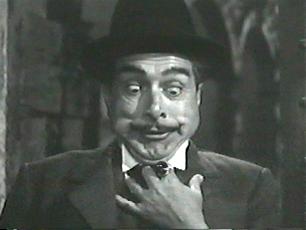 What
would have made an okay coda, but then the Komic Commissario
appears in the front door mere seconds after leaving (leading
me to suspect that this bit was hurriedly tacked on), addressing
the audience directly and laughing at the very idea of a crawling
hand... just as a hand wearing an enormous ring scrabbles
up his front toward his neck, frightening him. It is then
revealed to be his own hand.... a joke so rank and bloody
improbable that all it lacks is a buck-toothed cry of "Gawwwww-lee!"and
"Now don't that beat all!"*
What
would have made an okay coda, but then the Komic Commissario
appears in the front door mere seconds after leaving (leading
me to suspect that this bit was hurriedly tacked on), addressing
the audience directly and laughing at the very idea of a crawling
hand... just as a hand wearing an enormous ring scrabbles
up his front toward his neck, frightening him. It is then
revealed to be his own hand.... a joke so rank and bloody
improbable that all it lacks is a buck-toothed cry of "Gawwwww-lee!"and
"Now don't that beat all!"*
It's a phase that horror fiction goes through every now and
then - everything must be seen to have a rational explanation
at the end. Witness The Hound of the Baskervilles, Mark
of the Vampire and Dr. X (though the latter does
rely on some fairly hoary science fiction for its explanation).
After a World War stretching back as far as recent memory
would allow, and the terrible discovery of the true nature
of the extermination camps in Europe, the American public
had little use for imaginary boogeymen - there were plenty
abroad in the real world, and they had just kicked their asses
en masse. The Psychotronic Encyclopedia of Film
identifies 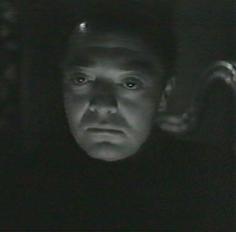 Beast
as "the last decent American horror film made for at
least another decade". That's not mere hyperbole, and
the fact that this film, already dilute, is given such a tepidly
"humorous" sendoff, more at home in Naish's radio
sitcom Life With Luigi than in a thriller - that fact
speaks reams of the studio's unwillingness to tread those
dark waters ever again - and, in fact, its reluctance to do
it in the first place.
Beast
as "the last decent American horror film made for at
least another decade". That's not mere hyperbole, and
the fact that this film, already dilute, is given such a tepidly
"humorous" sendoff, more at home in Naish's radio
sitcom Life With Luigi than in a thriller - that fact
speaks reams of the studio's unwillingness to tread those
dark waters ever again - and, in fact, its reluctance to do
it in the first place.
Classic? No. There are about fifteen minutes of classic horror stuck in an hour and fifteen minutes of too-obvious murder "mystery". It's going to be that fifteen minutes of Lorre vs. The Hand which is going to stick with the viewer, and that part is deserving of the status - that is the part that Forry praised, and rightly so. Like a prehistoric insect trapped in amber, it promises knowledge and dreams unknown - unfortunately, a promise which - enmired in its shiny, pretty, well-made prison - it simply cannot keep.
RATING:
![]()
![]()
You know what this movie needed? It really needed a Great Dane with a speech impediment. That's what it needed.
- May 19, 2001
|
